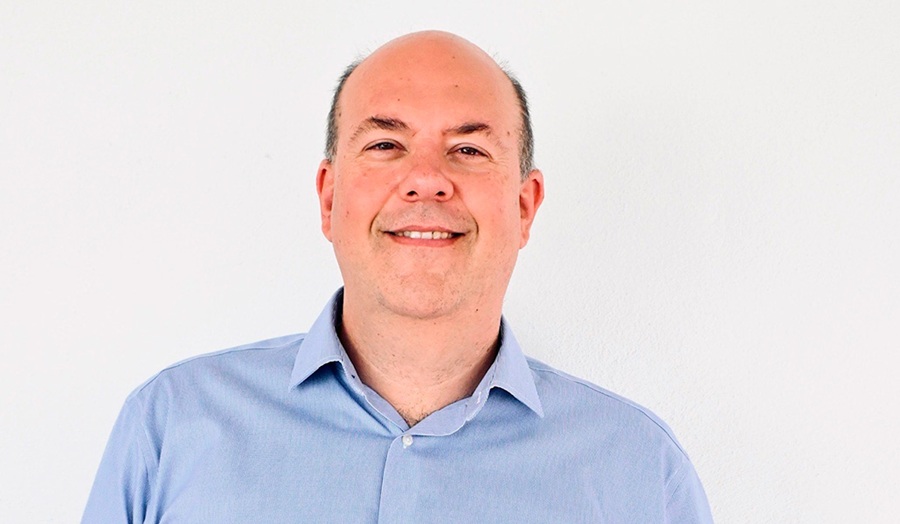- Face to face
- 22 de September de 2025
- No Comment
- 10 minutes read
Daniel Arias: “We cannot be our students’ friends or colleagues, but rather their proper instructors”

FACE TO FACE WITH
Daniel Arias Aranda, Professor of Business Organisation at the University of Granada
Daniel Arias: “We cannot be our students’ friends or colleagues, but rather their proper instructors”

Daniel Arias Aranda (Madrid, 1972) is Professor of Business Organisation at the University of Granada. He holds a Bachelor’s degree in Business Administration and another in Economics from the Universidad Carlos III in Madrid, and later earned a PhD in Economic and Business Sciences from the Complutense University of Madrid. Over the course of a distinguished academic and research career, he has specialised in Operations Management, Innovation and Technology Management, and the implementation of ERP systems in supply chain management.
Alongside his academic work, Arias Aranda has become a prominent critic of higher education in Spain. His open letter “Querido alumno universitario de grado: te estamos engañando” (literally “Dear undergraduate student: we are deceiving you”) went viral in 2023, sparking widespread debate on the state of university teaching. The letter subsequently evolved into a book, Querido alumno: Te estamos engañando (literally, Dear Student: We Are Deceiving You; no English edition available) in which he explores in greater depth the systemic challenges of higher education. This interview seeks to explore Daniel Arias Aranda’s perspective on teaching, innovation and the current challenges facing the education system. Speaking with him has been a pleasure, thanks to his clarity of thought, knowledge, and humility.
Professor Arias Aranda, your open letter provoked considerable debate within the academic community. What prompted you to write it?
The letter coincided with my completing twenty-five years of teaching, and I wanted to take stock of that journey. I compared my earliest students with those I teach today and was struck by the stark cognitive gap between them. Faced with such differences, I felt compelled to put my thoughts into writing. Teaching has changed dramatically, and despite the fact that we now have more resources than ever before, the overall level has declined.
“Teaching has changed dramatically, and despite the fact that we now have more resources than ever before, the overall level has declined”
In your book Dear Student: We Are Deceiving You, you identify serious deficiencies in the education system. Which do you consider the most urgent to address?
It’s not exactly easy for me, since there are so many, but perhaps the first is the system’s lack of flexibility. It is highly compartmentalised into silos, and many students arrive at university without a clear understanding of the degree they have chosen. We need to break down those barriers so that students can gain a fuller understanding of the specialisms available to them. Too often they embark on courses ill-suited to their interests or preparation. Another pressing issue is the erosion of teachers’ authority in the classroom. Today, one can do very little when faced with disruptive students or those with diagnosed difficulties.
You have also noted that many students arrive at university lacking even basic competencies. Why do you think this is, and how might it be improved?
First, their vocabulary is very limited. Many cannot express themselves properly, nor are they able to write down coherently what they think they know. Secondly, their attitude is a problem: most are constantly distracted by their mobile devices, which prevents them from listening or engaging in class.
“Many cannot express themselves properly, nor are they able to write down coherently what they think they know”
If universities were more demanding, might those deficiencies be corrected?
The system itself is perverse. If a lecturer fails too many students, the department’s budget is reduced.
And the consequence of this is…?
That many academics lower their standards in order to pass more students.
In another interview you argued that with the arrival of artificial intelligence, “traditional assessment is dead”. How should education adapt to this new reality?
AI is here to stay, so we must not prohibit it but instead adapt to it, setting clear boundaries for its use. In my own teaching, I ask students to write by hand under my supervision. Yet AI evolves so quickly that it will be very difficult for teaching staff to keep adapting to each new development.
Your own research includes the implementation of ERP systems in business. What lessons might business management offer education?
The parallels are striking. In business, as in education, the first step is to analyse the data. For instance, PISA scores have fallen while resources have increased. Such contradictions need to be examined and made explicit. From there we must design strategies for improvement and, crucially, think carefully about how to implement them.
“The German system is far more practical, integrating theory and practice”
You have been a visiting professor at universities abroad. What differences have you observed between the Spanish system and those of other countries?
I know both the Anglo-Saxon and German systems well. In Germany, for example, on the first floor of the SRH Berlin University of Applied Sciences students are setting up companies, while on the second floor their professors are teaching theory. The German model is therefore much more practical, combining theory with application. And significantly, in more than thirty years it has barely changed – for the simple reason that it works.
And the Anglo-Saxon model?
It is far more flexible. Take university entrance, for instance: one can sit the examinations at the age of fourteen, and if successful, proceed directly to university. Moreover, undergraduates are free to take courses outside their degree programme, gaining broader, interdisciplinary knowledge.
What is your view of the Spanish university entrance system?
It requires rethinking, and greater flexibility, more in line with the Anglo-Saxon model. I even have a somewhat controversial proposal regarding regional languages. In Madrid, students know nothing of the linguistic foundations or the literature of Catalan, Galician and the other autonomous languages. I believe they should: it is part of our shared cultural heritage. But whenever I suggest this…
“The Anglo-Saxon model is far more flexible. One can sit university entrance examinations at fourteen, and if successful, proceed directly to university”
I can imagine. Beyond your academic career, you have also ventured into fiction. Your novel La respuesta a todo (literally, The Answer to Everything; no English edition available) has been a success. What led you towards fiction, and what did you hope to achieve through it?
My research explores the impact of technology on society, and from that emerged a trilogy of novels. They imagine how technological change, evolving at breakneck speed, reshapes everything in a very short time. Today it is not far-fetched to think of visualising dreams or transplanting minds into a computer. Science fiction gives me the imaginative space to explore such possibilities.
You also host the section “Economía Extraña” (Strange Economy) on the podcast “Días Extraños” (Strange Days), where you explain economic issues in an accessible manner. How can such outreach improve public understanding of economics?
By making use of every available medium and by focusing on the more anecdotal aspects of economics to teach in an entertaining way. The positive potential of social media is invaluable here: it provides the feedback that allows one to keep learning oneself.
“A good teacher’s aim must be to educate students at the highest level. That does not mean making them happy, but drawing the fullest potential from their abilities”
You have received the University of Granada’s Award for Excelencia Docente. What, in your view, is essential to being a good teacher today?
A good teacher’s aim must be to educate students at the highest possible level. That does not mean making them happy, but drawing the fullest potential from their abilities. Whoever achieves that is a genuinely good teacher. We cannot be our students’ friends or colleagues, but rather their proper instructors.
Finally, what changes would you prioritise to improve the quality of university education in Spain?
One among many would be to improve how curricula are designed. At present, they are drafted through negotiations between departments, each pursuing its own interests, with little involvement from the administration or from social stakeholders. Take medicine, for example: psychology could be introduced to help future doctors improve their dealings with patients. Another would be to accelerate curriculum reform through new technologies. All too often, by the time a curriculum is updated, it is already obsolete.
Source: educational EVIDENCE
Rights: Creative Commons


